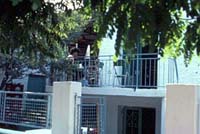

Who do you think you are?
A Brief History of the Name
The name Smyrniotis belongs to a Greek family now spread world-wide. In Greek, the word means 'The man from Smyrna,' a town on the west coast of what is now Turkey (Turkish name Izmir,) one of the former Greek settlements around the Mediterranean, colonised since antiquity.
In Greek the suffix -otis when applied to a (male) noun is descriptive and turns it into an adjective. It is a bit like saying, London, London-er.
But the family did not come from Smyrna. Things are more interesting than that.
This could be the story of survival of many a family through centuries of struggle, success and failure, tragedy, suffering and the occasional triumph.
Originally the surname was Katsinas and the family lived in a small village, Platanos, on the Peloponese, on mainland Greece. The village remains small to this day.
Then it
all started around 1750; the great-grandfather of the author's grandfather
left Platanos and sought his fortune among the Greeks of Smyrna - a much
bigger world than tiny Platanos.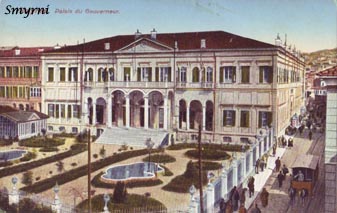
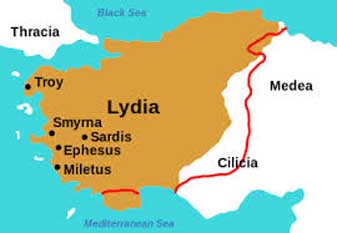
His Christian name was Ioannis (John).
Although under the rule of the Ottoman Empire at the time, most of that Aegean coastline had been occupied by Greeks. In fact Greeks only left Asia Minor in the 1920's after a disastrous short war.
Smyrna had been an important trade centre well into the days of the British Empire when, for a time, it was the third biggest trading centre for Britain.
Greece itself had become a province of the Ottoman Empire after 1453 when Constantinople (Byzantium) fell to the Turks, until Greece was liberated four hundred years later, in 1828, after the long and bloody uprising of 1821 and with the help of British, French and Russian naval power.
Back to the 1750's in Smyrna, John Katsinas soon came to the attention of the local Pasha (Pasa) for his exceptional business and organisational skills - a gift which seems to have been genetic and passed on through the generations to emerge from time to time in the occasional descendant. To this day, many in the family run their own businesses and remain fiercely independent from each other - a significant family trait.
And so the great Pasha appointed John as his general administrator.
The story was repeated in the 1960's when the author's own father, Konstantinos (Constantine), or Kostas for short, penniless like many in post-war Athens, was talent-spotted by a small factory owner after a short spell as his salesman, and was made equal partner and co-owner in the business without putting in any capital. And the business grew after that until Kostas's death. That is where the 'K' comes from in the author's name.
Back to our story in Smyrna: One day, John Katsinas faked a theft. Some say he had felt unrewarded for the work he had done. So he hid money from some of his master's various sources and put it to one side. Whether the Pasha suspected anything is unknown, but he is reputed to have said, "Do not worry about it, John, we have so much more."
Time passed and the 'theft' was forgotten. John decided it was time to return to Platanos. He told the Pasha his mother was ill and he wanted to go and see his family. The Pasha agreed to let him go for as long as he wanted, and gave him much to take with him. John took all of that, along with what he had hidden away, and returned to Platanos.
News of his imminent return travelled ahead of him. In the days of no buses, trains or aeroplanes, and not even telephones, such long travels were rare and made very big news. The whole district buzzed with excitement.
And the news was, 'The man from Smyrna' (the Smyrniotis) is coming back! So by the time he got back, everyone already called him 'the Smyrniotis.'
His arrival was hugely fated, his new 'name' was on everybody's lips, he started introducing himself as that, and so that became his surname.
In Greek, the initial 'S' in Smyrniotis (not in other Greek words) is pronounced like a ' Z ' as in 'President', which is a Byzantine pronunciation - and makes the name easier to say also.
This first ever Smyrniotis and family-name founder, John I, went on to have a son called Andreas, who had a son called Thimios, who had a son called John (II), born 1880, who was the author's grandfather.
This latter John (II) had a brother, Andonis (Anthony) who remained in Platanos and founded a different branch of the Smyrniotis family, some of whom emigrated world-wide, to include today renowned physicians, scientists and other professionals.
John (II) also left Platanos one day and went to work for a successful shop-owner in Patra, the provincial capital and biggest town on the Peloponese peninsula, and third biggest town in Greece. Such towns had much greater importance in the days of the transport and communications systems of the time; they were the equivalent of great trading cities.
Later, the shop owner, a Mr Papaseretis, wanted to open a new branch in a village (now a growing town) further west on the Peloponese. Today the town is called Varda, (now on Google Street View) but the village of the time was called Vardia, which means 'shift' in Greek, as in night-shift.
The village was called Vardia (shift) because in those days the only transport between Patra and Pyrgos, the next big town, was by four-horse carriage; the village of Vardia was the midway point of the journey, and they had set up great stables there so that the carriages could stop, the horses could rest, and a new shift (vardia) could take over and continue the journey.
The story illustrates how our genes work, traits often skipping a generation just as demonstrated by geneticist Mendel: John II had inherited the gift of his great grandfather of Smyrna fame. So now the original story was repeated: Shop-owner Papaseretis spotted the talent in this new John Smyrniotis, for good administration and management, and chose him to open the branch in Vardia.
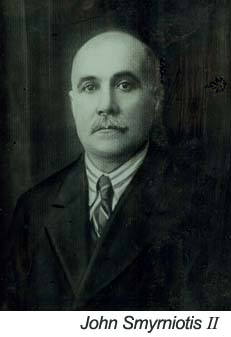 John
Smyrniotis II arrived
in Vardia to open the new branch. He was still single, but this was about
to change. In Vardia, there was a great landowner, a certain Mr Linardos,
who had five children: Nikos, Alexandra, Eleni, Ourania, and the girl
John married, Vasiliki. Linardos was a descendant of the Linardi family,
Venetian merchants with their own, officially recognised coat of arms.
John
Smyrniotis II arrived
in Vardia to open the new branch. He was still single, but this was about
to change. In Vardia, there was a great landowner, a certain Mr Linardos,
who had five children: Nikos, Alexandra, Eleni, Ourania, and the girl
John married, Vasiliki. Linardos was a descendant of the Linardi family,
Venetian merchants with their own, officially recognised coat of arms.
Of those five, Nikos later went to America and became a guitarist - something also seemingly genetic as both the author and his brother learned to play guitar before they knew of this.
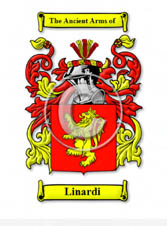 So
Linardos, the father, offered John Smyrniotis II
the hand of his daughter in marriage with acres of land as a dowry. In
today's thriving town of Varda this land, now owned mostly by others,
has become prime local estate, but even back then it was adjacent to the
main arterial road, the High Street, so to speak, as well as neighbouring
the railway station.
So
Linardos, the father, offered John Smyrniotis II
the hand of his daughter in marriage with acres of land as a dowry. In
today's thriving town of Varda this land, now owned mostly by others,
has become prime local estate, but even back then it was adjacent to the
main arterial road, the High Street, so to speak, as well as neighbouring
the railway station.
The author and his relatives still own pieces of land in Varda to this day, subdivided into small plots among the heirs as common practice in Greece, even though the latest generation live all over the world, from New York and London to Germany, Belgium and Greece itself.
With his wife Vasiliki, reputedly a loving woman, John II became successful and prospered and acquired much additional land.
John and Vasiliki had ten children, nine sons and one daughter, in this order: Christos, Apostolos, Sotiris, Panos (who died aged 11 from meningitis), Kostas (the author's father), Litsa (the only girl), Andreas, Menis, Nikos and Pericles.
The first born, Christos, was an exceptionally gifted man. He went to study physics, chemistry and maths at Athens University where he was viewed as a genius. Christos was known as a genteel and polite man. He later suffered a nervous breakdown, supposedly from the mental strain or stress, from which he never recovered. He died much later at a ripe old age.
In 1912,
in celebration of the birth of his only daughter, John II
bought a lottery ticket and won a large sum, which he used to build a
house.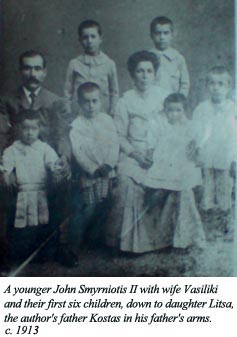
In 1916, Spanish flu struck and the dead were carried off by the cartload. Among them were wife, Vasiliki, and John's youngest son Pericles. John was left with the remaining children, so he remarried a certain Georgitsa who was, reputedly, a cruel stepmother to the children - John having been a strict disciplinarian himself.
In the meantime, John, now successful in his own right, had decided to leave the employee of the Patra shop owner and have his own shop in Varda.
Varda had become the proper name for the village, from Vardia which had simply described it as a place of shift-change.
John's independence came with the blessing of Patra proprietor Papaseretis, although it is unclear whether John opened his own shop or bought the old shop out. John was also a very religious, Greek Orthodox, man. After he had prospered, he built the local village church, a substantial building, and his name still appears on a marble plaque on the front façade of the church, as one of its "Great Donors".
When he died (1955), the church enhanced his tomb with a marble cross and an inscription, which named him as a great benefactor to the church and quoted Jesus, "I am the life and the resurrection. He who believes in me, even if he dies, he will live." He was buried with his first wife Vasiliki and their youngest son Pericles, the Spanish flu victims.
His second wife, Georgitsa, outlived him and went away to live with her nephew in the town of Pyrgos, where she had a difficult old age and a difficult death in 1963.
Just like their father John II, seven of his surviving children went on to father mainly sons (genes strangely in evidence again). As mentioned, he had had nine sons and one daughter, and they have had a total of eleven sons (including the author) and only four girls. Interestingly, this was reversed in the following generation who, to this day, have fathered fifteen girls and only two boys. Something for geneticists to get their teeth into, but very much against mathematical probability, so genes evidently in play.
In total,
the author shares the name John (or Yiannis, Giannis, Ioannis) Smyrniotis
(some spell it Smirniotis) with several contemporary relatives world-wide,
the exact number unknown to him.
